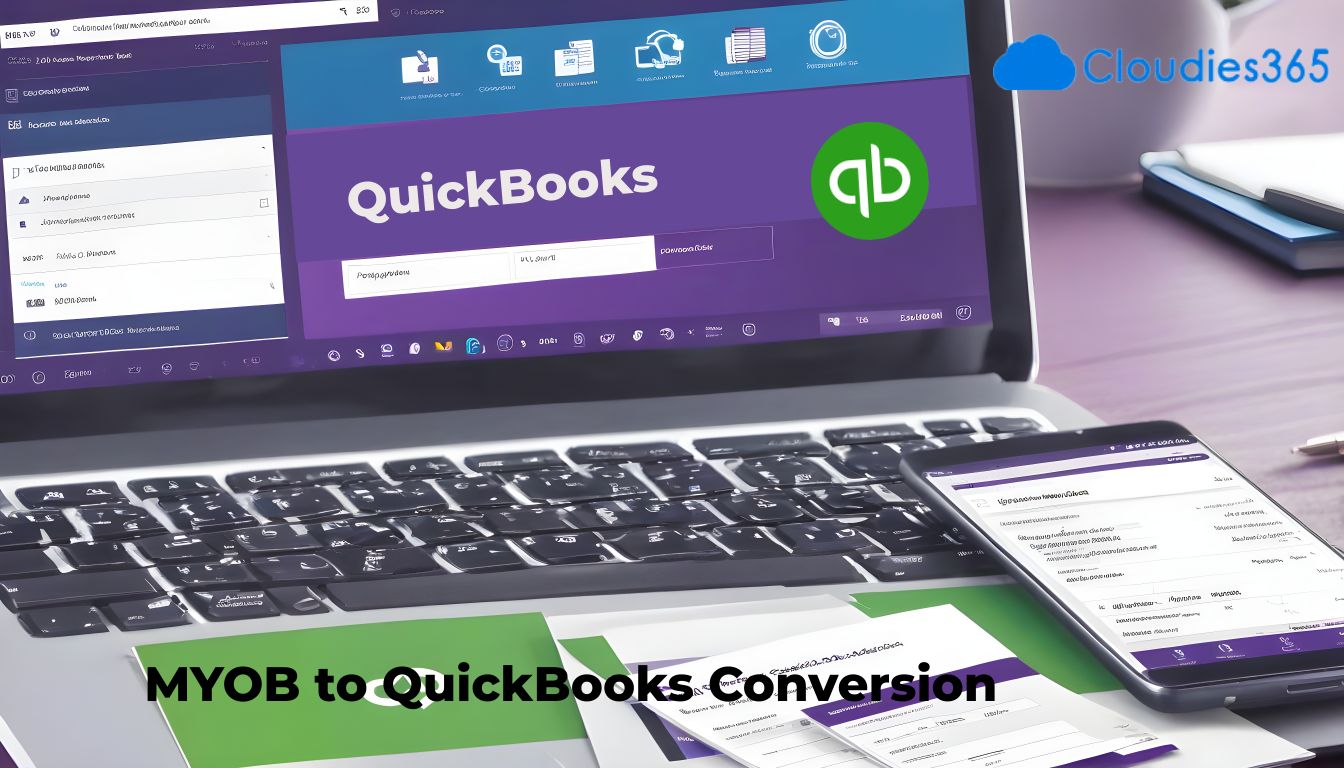Welcome to our blog, where we delve into the world of accounting software and help you navigate through the complexities of MYOB to QuickBooks conversion. If you are currently using MYOB and considering making the switch to QuickBooks, you’ve come to the right place! In this article, we will provide you with tips and insights on how to successfully convert from MYOB to QuickBooks, ensuring a seamless transition that maximizes efficiency and productivity for your business.
Whether you’re a small business owner or an accountant looking for more advanced features, understanding the difference between these two popular accounting platforms is crucial. So let’s begin by exploring what exactly MYOB is and how it differs from QuickBooks. Get ready for some eye-opening revelations that will help shape your decision-making process!
What is MYOB
MYOB, which stands for Mind Your Own Business, is an accounting software that has been a staple in the industry for many years. It was initially developed for small and medium-sized businesses in Australia and New Zealand but has since expanded its reach to other countries.
One of the key features of MYOB is its ability to handle various aspects of financial management, such as invoicing, payroll processing, inventory tracking, and bank reconciliation. It offers a user-friendly interface that makes it relatively easy for non-accountants to navigate through basic bookkeeping tasks.
Additionally, MYOB provides robust reporting capabilities that enable users to generate detailed financial reports like profit and loss statements or balance sheets. This can be particularly helpful when analyzing business performance and making informed decisions based on accurate financial data.
Moreover, MYOB allows integration with other software applications commonly used by businesses such as customer relationship management (CRM) systems or point-of-sale (POS) systems. This integration streamlines processes further by eliminating manual data entry and reducing errors.
MYOB has established itself as a reliable accounting solution over the years with its comprehensive set of features tailored towards small to medium-sized businesses. However, if you’re considering switching to QuickBooks, let’s explore why this might be a beneficial move for your business!
Understanding the Difference Between MYOB and QuickBooks
When it comes to managing your business finances, choosing the right software is crucial. Two popular options in the market are MYOB and QuickBooks. While both offer similar features for accounting purposes, there are significant differences between the two.
MYOB (Mind Your Own Business) is an Australian-based accounting software that has been around since 1991. It offers a comprehensive range of tools for small businesses, including invoicing, inventory management, payroll processing, and tax calculations.
On the other hand, QuickBooks is a product of Intuit Inc., an American company that specializes in financial software solutions. QuickBooks provides a user-friendly interface with powerful features such as expense tracking, sales reporting, bank reconciliation, and integration with third-party applications.
One key difference between MYOB and QuickBooks lies in their target markets. MYOB primarily caters to small businesses within Australia and New Zealand. In contrast, QuickBooks has a global presence and can accommodate businesses of all sizes across various industries.
Another distinction lies in their pricing models. MYOB typically offers one-time purchase options or subscription plans based on different tiers of services. Meanwhile, QuickBooks operates on a monthly or annual subscription basis depending on the specific features needed by users.
Why Convert from MYOB to QuickBooks?
If you’re currently using MYOB and considering a switch to QuickBooks, you may be wondering why it’s worth making the change. Well, there are several reasons why many businesses are opting for QuickBooks over MYOB.
QuickBooks offers a more user-friendly and intuitive interface. Its sleek design and easy navigation make it simple for users of all skill levels to navigate through the software without getting overwhelmed.
QuickBooks provides more advanced features and functionality compared to MYOB. From inventory management to project tracking, QuickBooks has an extensive range of tools that can help streamline your business operations and improve efficiency.
Another key advantage of converting from MYOB to QuickBooks is the seamless integration with other popular business applications. With its wide range of third-party integrations, including eCommerce platforms and payment gateways, you can easily sync your data across multiple systems.
Additionally, by switching to QuickBooks, you’ll have access to a robust reporting system that allows you to generate customized reports specific to your business needs. This level of detail enables better financial analysis and decision-making.
Converting from MYOB to Quickbooks can offer significant benefits in terms of usability, functionality, integration options,and customer support – ultimately helping your business thrive in today’s competitive landscape.
Things to Consider Before Converting
Before making the decision to convert from MYOB to QuickBooks, there are several important factors you should consider. Taking the time to carefully evaluate these aspects will help ensure a smooth and successful conversion process.
It’s crucial to assess your business needs and requirements. Consider why you want to switch accounting software in the first place. Are there specific features or functionalities that QuickBooks offers that MYOB lacks? Clearly identifying your objectives will help guide your decision-making process.
Additionally, take into account the size and complexity of your organization’s financial data. If you have large volumes of transactions or complex reporting requirements, it’s vital to choose a solution that can handle this level of data without compromising performance.
Another key consideration is compatibility with other systems and applications used within your company. Evaluate if QuickBooks integrates seamlessly with any existing software or tools that are essential for running your business efficiently.
Furthermore, think about the learning curve involved in using QuickBooks compared to MYOB. Assess whether you need additional training for yourself or your team members before embarking on the conversion process.
Don’t forget about cost implications. Take into account not only the initial investment required for switching but also ongoing expenses such as licenses and support fees.
Considering these factors before converting from MYOB to QuickBooks will set you up for a successful transition and ensure that you make an informed decision based on what best suits your business needs.
Step-by-Step guide for a Smooth Conversion
Here’s a step-by-step guide for a seamless conversion:
1. Evaluate your needs:
Before starting the conversion process, take some time to understand why you want to switch from MYOB to QuickBooks. Identify the specific features and functionalities that are important for your business.
2. Prepare your data:
Gather all relevant financial data from MYOB and ensure it is organized and up-to-date. This includes customer information, invoices, payments, inventory records, and more.
3. Choose the right version of QuickBooks:
There are different versions of QuickBooks available, so make sure to select the one that best suits your business requirements. Consider factors such as scalability, pricing, and additional features.
4. Install QuickBooks:
Once you have selected the appropriate version of QuickBooks, download and install the software on your computer or use a cloud-based solution if preferred.
5. Set up company file:
Create a new company file in QuickBooks by entering essential details such as company name, address, fiscal year start date, etc.
6. Customize preferences:
Configure settings in QuickBooks according to your business preferences. This includes selecting default accounts for income and expenses categories or setting up tax rates.
7. Enter opening balances:
Input accurate opening balances for bank accounts, vendors’ outstanding bills or credits owed by customers into QuickBooks before starting with day-to-day transactions.
8. Transfer data from MYOB to Excel:
Export necessary data from MYOB into Excel format (e.g., customer lists) so that it can be easily imported into QuickBooks later on.
9. Import data into QuickBooks:
Use the import feature within Quickbooks to bring in relevant information from Excel files created in previous steps including chart of accounts customers list employee list etc.
10. Verify accuracy & reconcile transactions :
Review all imported data carefully ensuring its integrity , then perform account reconciliations regularly during initial period post-conversion.
11. Set up bank feeds:
Connect your bank accounts and credit cards to QuickBooks, allowing for automatic reconciliation of transactions and easier tracking of expenses and income.
12. Train employees:
If you have a team, make sure to train them on how to use QuickBooks effectively. This will help ensure accuracy in data entry and proper utilization of the software’s features.
13. Run parallel systems:
Consider running both MYOB and QuickBooks simultaneously for a period of time to ensure that all data has been transferred accurately and that there are no discrepancies between the two systems.
14. Seek professional help if needed:
If you encounter any issues during the conversion process, don’t hesitate to seek help from QuickBooks experts or an accountant familiar with the software.
15. Monitor progress:
Keep track of your progress as you start using QuickBooks, making note of any challenges or areas that require improvement. This will help you make necessary adjustments to ensure a smooth transition.
Common Challenges and How to Overcome Them
Converting from MYOB to QuickBooks can be a complex process, and it’s important to be prepared for any challenges that may arise. Here are some common hurdles you may encounter during the conversion, along with tips on how to overcome them.
1) Data Compatibility:
One of the main challenges is ensuring that your data from MYOB is compatible with QuickBooks. To overcome this, make sure you thoroughly review the data mapping and mapping rules before initiating the conversion process. This will help ensure that all your financial information is accurately transferred.
2) Learning Curve:
Switching to a new accounting software can come with a learning curve, especially if you have been using MYOB for a long time. To overcome this challenge, take advantage of the training resources provided by QuickBooks. Attend webinars or tutorials that can help familiarize yourself with the features and functionalities of the software.
3) Customization Differences:
Another challenge is adjusting to any differences in customization options between MYOB and QuickBooks. Take some time to explore QuickBooks’ customization settings so you can tailor it according to your business needs.
4) Reconciling Accounts:
Reconciling accounts after migration may pose some difficulties due to variations in how each software handles transactions and account balances. It’s crucial to carefully match up transactions in both systems during reconciliation processes.
5) Seek Expert Assistance:
If you are experiencing significant challenges or facing technical issues during the conversion process, don’t hesitate to seek assistance from an expert who specializes in MYOB-to-QuickBooks conversions.
By being aware of these common challenges and following these tips on how best to tackle them head-on, you’ll increase your chances of having a smooth transition from MYOB to QuickBooks.
Benefits of Switching to QuickBooks
Switching from MYOB to QuickBooks can offer a range of benefits for your business.
Here are some key advantages you can expect when making the switch:
1. Streamlined Financial Management:
QuickBooks provides a user-friendly interface and robust features that allow for efficient financial management. From invoicing and payroll processing to expense tracking and budgeting, QuickBooks simplifies these tasks, saving you time and effort.
2. Improved Reporting and Analytics:
With QuickBooks, you gain access to comprehensive reporting tools that provide valuable insights into your business’s financial performance. These reports help you make informed decisions, identify trends, and plan for future growth.
3. Seamless Integration with Third-Party Apps:
QuickBooks offers seamless integration with a wide array of third-party applications such as payment processors, CRM systems, inventory management tools, and more. This allows for automated data syncing across platforms, increasing efficiency in day-to-day operations.
4. Mobile Accessibility:
QuickBooks offers mobile apps that enable you to manage your finances on the go. Whether it’s checking sales figures or sending invoices from your smartphone or tablet, this flexibility ensures that you stay connected even when away from the office.
5. Scalability:
As your business grows, so do its needs. Fortunately, QuickBooks is scalable and can adapt to accommodate businesses of all sizes – from startups to large enterprises.
These are just a few examples of how switching from MYOB to QuickBooks can benefit your business by streamlining processes, improving reporting capabilities, integrating seamlessly with other applications, and providing scalability options.
By harnessing these benefits, you can enhance productivity and drive success in today’s competitive market.
So why wait? Make the switch today!
Conclusion
As you can see, converting from MYOB to QuickBooks can be a daunting task. However, with proper planning and execution, it is definitely achievable. By understanding the differences between MYOB and QuickBooks and considering the potential challenges that may arise during the conversion process, you can ensure a smooth transition.
Remember to carefully evaluate your business needs before making the decision to convert. Take into account factors such as scalability, functionality, and cost-effectiveness. If QuickBooks aligns better with your requirements and goals, then it may be worth making the switch.
By following the step-by-step guide provided in this article and seeking assistance if needed, you can minimize any disruptions or data loss during the conversion process. Take advantage of available resources such as tutorials, forums, or even professional consultants who specialize in MYOB to QuickBooks conversions.
The benefits of switching to QuickBooks are significant – improved efficiency and productivity through automation features, enhanced reporting capabilities for better financial analysis, seamless integration with other software applications commonly used by businesses today – just to name a few. Not only will you save time but also gain valuable insights that can drive informed decision-making for your business.



















No Comments